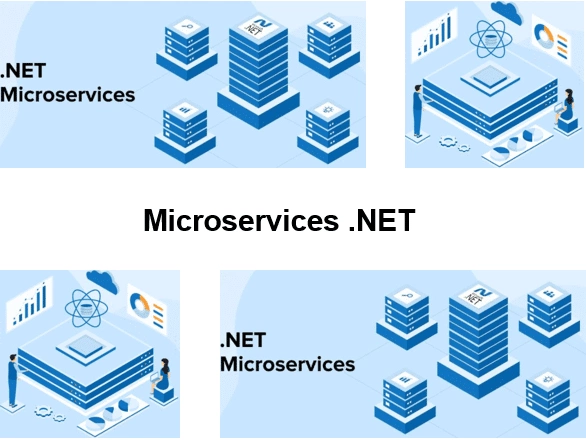- Leren door doen
- Trainers met praktijkervaring
- Klassikale trainingen
- Gedetailleerd cursusmateriaal
- Duidelijke inhoudsbeschrijving
- Maatwerk inhoud mogelijk
- Trainingen die doorgaan
- Kleine groepen
In de cursus Microservices dotNET van SpiralTrain leren deelnemers schaalbare microservices bouwen en beheren met ASP.NET Core, event-driven architecturen, API gateways, containerisatie en deployment naar Kubernetes.
De cursus start met een overzicht van de microservices-architectuur, inclusief de voordelen, uitdagingen, decompositie-strategieën, domein-gedreven ontwerp (DDD) en het ontwerpen van bounded contexts.
In deze module leren deelnemers microservices op te bouwen met ASP.NET Core, inclusief minimal APIs, API-versionering, configuratie via het Options Pattern, en het toepassen van de Clean Architecture.
Deelnemers leren over synchrone en asynchrone communicatie, het bouwen van een API Gateway met YARP, gebruik van gRPC, service discovery en het introduceren van service meshes.
Deze module behandelt beveiliging binnen microservices, OAuth 2.0, OpenID Connect, gebruik van IdentityServer, API policies, distributed identity management en het beveiligen van gateways.
Deelnemers leren de principes van event-driven systemen, message brokers zoals RabbitMQ en Kafka, event sourcing, de outbox pattern, en het coördineren van events via saga’s.
Deze module gaat in op data-consistentie in gedistribueerde systemen, database per service strategieën, CQRS, eventual consistency en polyglot persistence.
Deelnemers leren fouttolerantie patronen zoals circuit breakers en retries met Polly, distributed tracing met OpenTelemetry, gestructureerd loggen en monitoring met Prometheus en Grafana.
De focus ligt op het containeriseren van microservices met Docker, gebruik van Docker Compose, CI/CD pipelines opzetten, deployment naar Kubernetes (AKS) en gebruik van Helm charts.
Tot slot verdiepen deelnemers zich in micro frontends, hybride architecturen, serverless integraties, event streaming, service mesh advanced topics en best practices voor grootschalige systemen.
De cursus Microservices .NET is bedoeld voor ervaren .NET developers die schaalbare, gedistribueerde applicaties willen ontwerpen en bouwen volgens de microservices-architectuur.
Grondige kennis van C#, ASP.NET Core en basiskennis van API-ontwikkeling, Docker en gedistribueerde systemen is vereist.
De training bestaat uit interactieve theoretische sessies, demonstraties en praktische hands-on labs onder begeleiding van een ervaren trainer.
Deelnemers ontvangen na succesvolle afronding een certificaat van deelname aan de cursus Microservices .NET.

Module 1: Intro Microservices |
Module 2: Microservices .NET Core |
Module 3: API Gateway |
|
What are Microservices? Microservices vs Monoliths Benefits and Challenges Domain-Driven Design Bounded Contexts Designing Microservices Evolutionary Architecture Microservices Patterns Decomposition Strategies Database per Microservice |
Building REST APIs Minimal APIs in ASP.NET Core Versioning APIs Model Validation Content Negotiation Health Checks Swagger and OpenAPI Service Registration and Discovery Service Configuration Options Pattern Microservices with Clean Architecture |
Synchronous Communication Asynchronous Communication Introduction to API Gateway Pattern Building an API Gateway with YARP Routing and Aggregation Authentication at Gateway Level gRPC Basics in .NET gRPC vs REST Service Mesh Concepts Using Dapr for Communication |
Module 4: Security |
Module 5: Event-Driven Architecture |
Module 6: Distributed Data |
|
Security in Microservices OAuth 2.0 and OpenID Connect IdentityServer Integration JWT Tokens and Validation Scopes and Claims API Authorization Policies User Authentication and Federation Distributed Identity Management Securing APIs behind API Gateway Handling Security at Service Mesh |
Event-Driven Architecture Overview Publish-Subscribe Pattern Message Brokers (RabbitMQ, Kafka) Event Sourcing Basics Integration Events Domain Events Idempotent Event Handling Outbox Pattern Saga Pattern Choreography vs Orchestration |
Challenges of Distributed Data CAP Theorem Database per Service Strategy Data Consistency Approaches Two-Phase Commit and Sagas CQRS Pattern Read Models and Write Models Eventual Consistency Cross-Service Queries Polyglot Persistence |
Module 7: Resilience |
Module 8: Containerization |
Module 9: Advanced Microservices |
|
Transient Fault Handling Retry Policies with Polly Circuit Breaker Pattern Timeout and Bulkhead Isolation Distributed Tracing (OpenTelemetry) Structured Logging with Serilog Centralized Logging with ELK Stack Prometheus and Grafana Health Checks Metrics Aggregation and Alerting |
Introduction to Containers Dockerizing .NET Microservices Creating Dockerfiles for Services Multi-Stage Builds Using Docker Compose Container Registry (ACR, DockerHub) Continuous Integration with GitHub Continuous Deployment to AKS Helm Charts for Deployment Rolling Updates |
Micro Frontends and Microservices Serverless and Microservices Hybrid Architectures Edge Services Event Streaming Architectures Domain-Oriented Microservices Service Mesh Advanced Topics Federated Identity across Services Multi-Cluster Deployments Best Practices for Large Systems |
